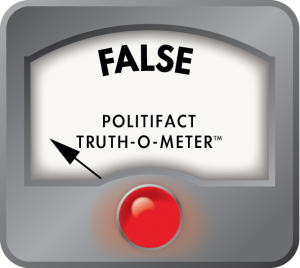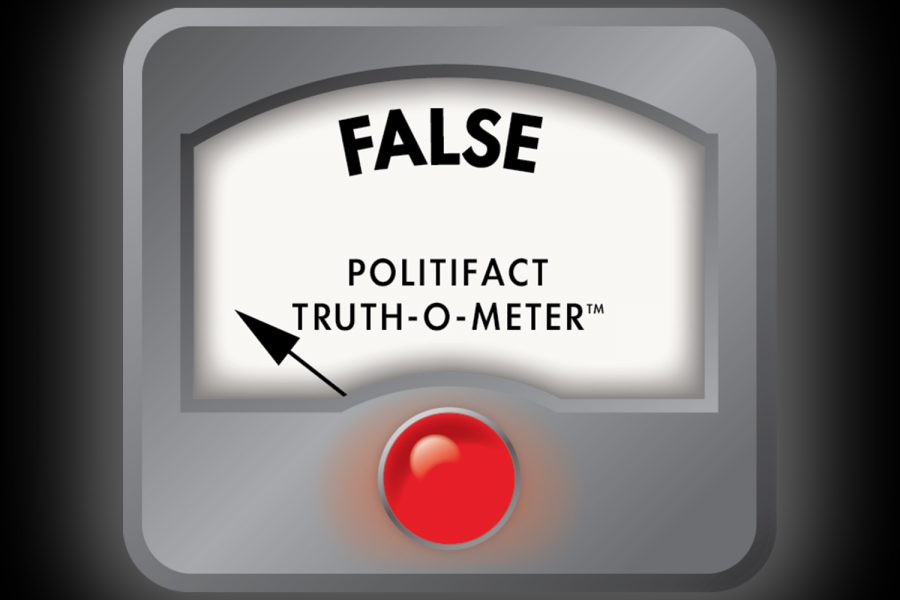Fact Check | No, Iowa’s ‘Back the Blue Act’ does not criminalize wearing the image of the U.S. flag on towels or swimsuits
Political and commercial photographer Greg Hauenstein said Iowans need to throw out items that show the American flag, but having those is not a crime under the new “Back the Blue Act.”
July 6, 2021
PolitiFact Iowa is a project of The Daily Iowan’s Ethics & Politics Initiative and PolitiFact to help you find the truth in politics.
Edited by Rachel Schilke, Robert Read, and Lyle Muller
If your time is short
- The “Back the Blue Act” signed into law by Gov. Kim Reynolds says a person using the U.S. flag to knowingly and publicly show disrespect with the reasonable expectation to provoke others is committing a simple misdemeanor.
- The law defines the flag as “a piece of woven cloth or other material designed to be flown from a pole or mast,” so the image of a flag on a piece of clothing would not qualify as a flag.
After Gov. Kim Reynolds signed a bill on June 17 that creates harsher penalties for protestors into law, Greg Hauenstein – a political and commercial photographer – took to Twitter to critique a part of the law outlining punishment for showing disrespect to the United States flag.
“Under the ‘Back the Blue’ Act that @KimReynoldsIA signed today you cannot ‘intentionally cut up or alter’ or ‘intentionally make physically unclean’ an American flag,” Hauenstein tweeted. “So throw out those towels and swimsuits, ladies and germs or you’re a criminal!”
Were the people sporting the American flag on articles of clothing this Fourth of July weekend committing a simple misdemeanor under Iowa’s law? We decided to look into it.
In Senate File 342, also known as the “Back the Blue Act,” Section 46 amends Iowa Code 2021 with a list of actions defined as a simple misdemeanor. The sixth item on the list states that someone commits a simple misdemeanor if they “knowingly and publicly use the flag of the United States in such a manner as to show disrespect for the flag as a symbol of the United States, with the intent or reasonable expectation that such use will provoke or encourage another to commit trespass or assault.”
The subsection defines showing disrespect as defacing, defiling, mutilating, or trampling the flag, which Hauenstein’s tweet implied would include the process of making and wearing the image of the flag.
However, the subsection defines flag as “a piece of woven cloth or other material designed to be flown from a pole or mast.”
A previous fact check found that the thin blue line flag does not violate the U.S. Flag Code because it does not fit the definition of a U.S. flag.
The image of the American flag on clothing does not meet SF 342’s definition of a flag, and therefore the defacing, defiling, mutilating, or trampling of that clothing does not qualify as a simple misdemeanor, which carries a penalty of a fine ranging from $105 to $855. The court also may order a maximum of 30 days in jail, according to Iowa Code.
Craig Robinson, the founder and editor-in-chief of The Iowa Republican, responded to Hauenstein’s tweet, pointing out that towels and swimsuits aren’t made of actual American flags, to which Hauenstein responded he was being facetious.
“I was being facetious, that’s just my style,” he confirmed in a conversation with PolitiFact Iowa.
Whether the Iowa law withstands constitutional challenges is another question.
Gene Policinski, chief operating officer and senior fellow for the First Amendment of the Freedom Forum Institute, said acts that would be considered a simple misdemeanor under SF 342 are protected by the First Amendment. In the 1989 Supreme Court case Texas v. Johnson, justices ruled 5-4 that flag burning constitutes symbolic speech protected under the First Amendment.
“I think the fundamental philosophy of these laws isn’t there,” Policinski said. “They’re certainly at odds with court decisions; they are impractical to enforce.”

Our Ruling
The “Back the Blue Act” creates punishment for showing disrespect for the U.S. flag, but the image of the flag on clothing or other fabric that is not used to make the flag does not qualify as a flag under Iowa law.
Additionally, desecration of the flag is protected under the First Amendment, according to the 1989 Supreme Court case Texas v. Johnson.
Hauenstein said that he was being facetious in his critique of the new Iowa law.
We rate the claim in the tweet to be False.
Sources
Senate File 342, signed into law June 17, 2021
Greg Hauenstein’s tweet, June 17, 2021
Greg Hauenstein interview, July 5, 2021
Gene Policinski interview, June 25, 2021 and July 5, 2021
Iowa Code 2021, Chapter 723
Iowa Code 2021, Disorderly Conduct, 723.4
PolitiFact, “No, the black and white flag for police solidarity does not violate flag code,” June 25, 2021
Iowa Code 2021, Misdemeanors, 903.1
Craig Robinson’s tweet, June 17, 2021
Hauenstein’s response tweet, June 17, 2021
Texas v. Johnson, United States Courts



